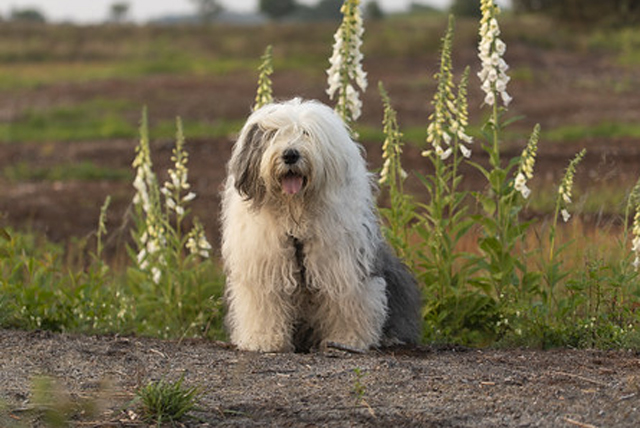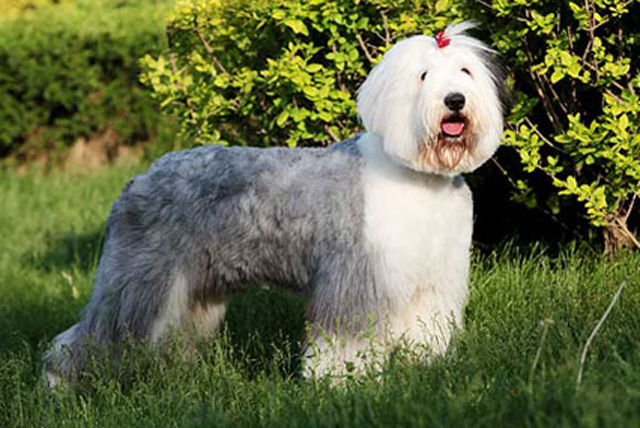iHeartDogs is reader-supported. When you buy via links on our site, we may earn an affiliate commission at no extra cost to you.

The Old English Sheepdog was bred to protect flocks from wolves and other threats, and many herding dogs still come from this intelligent, energetic breed. Their iconic resounding bark also makes them great watchdogs. But they’re not all working dogs, and any person would be lucky to have this floofy, strong, and loyal dog as a member of their pack.
Unfortunately, the Old English Sheepdog breed is predisposed to certain medical conditions. While these health issues can be expensive to treat, you may be able to cover the high costs if you invest in pet insurance for your dog early.
It’s easy to feel overwhelmed when it comes to choosing the right pet insurance plan for your beloved Sheepdog. This guide will help you select a plan that covers everything you want it to, so you can be there for your dog when it needs you most.
Compare The Top 9 Pet Insurance Plans for Your Old English Sheepdog Using our Free No-Obligation Quote Tool below
The simplest way to compare pet insurance prices is to use our tool below. The comparison tool will show you quotes from the top 9 pet insurance carriers, including Trupanion, Pets Best, Lemonade, ManyPets, FIGO, HealthyPaws, Prudent Pet, Spot, and Embrace pet insurance.
How Much Does Pet Insurance for an Old English Sheepdog Cost?
Below are some sample pet insurance plans for a 1-year-old male Old English Sheepdog using the zip code 75001 (Texas) as an example.
- Pets Best – $42.27 per month
- Embrace – $57.07 per month
- Healthy Paws – $42.20 per month
- ManyPets – $38.65 per month
Ultimately, your plan’s premium will depend on several factors, including your dog’s age, size, and breed, as well as where you live. You also want to know what type of coverage your plan has and if it will help with Old English Sheepdog-specific health problems. Let’s get more into those medical conditions and how much you can expect to pay to treat them.
Common Health Problems Associated With Old English Sheepdogs
Hip Dysplasia in Old English Sheepdogs
Hip Dysplasia is one of the most common orthopedic problems in larger breed dogs, including Old English Sheepdogs. The hip joint is a ball and socket joint, and hip dysplasia causes malformation of the two components. That makes it difficult for your dog to walk, and the chronic laxity can cause abnormal wear, which leads to osteoarthritis.
RELATED: What You Need To Know About Hip Dysplasia
Autoimmune Hypothyroidism in Old English Sheepdogs
The thyroid gland regulates the body’s metabolism. Sometimes, the thyroid can become under-active, which is called “hypothyroidism.” It occurs when the immune system recognizes the dog’s thyroid as foreign and attacks it, slowing your dog’s metabolism.
Hypothyroidism could result in weight gain, lethargy, or changes in hair and skin condition in your Old English Sheepdog.
Primary Ciliary Dyskinesia in Old English Sheepdogs
Primary Ciliary Dyskinesia is a group of inherited disorders that cause defects in the dog’s upper and lower respiratory tract or dysfunction of “motile cilia.” Cilia cells that line the trachea play a major role in sweeping mucus and dirt out of the lungs. Improperly functioning cilia results in poor mucus clearance from the airways.
Chronic mucus plugging and inflammation of the nasal cavities, trachea and lower airways, in turn, leads to recurrent respiratory tract infections. Dogs with malfunctioning cilia cells may also become infertile.
This particular genetic mutation is more common in Old English Sheepdogs. Dogs that are DNA tested and found to be carriers should not be bred to avoid passing on the disorder.
PCD isn’t curable, but it can be managed for several years. Medical management involves adequate monitoring and judicious use of antibiotics. Eventually, however, the disease will progress, and the response to treatment will become poorer.
Deafness And Hearing Loss in Old English Sheepdogs
Old English Sheepdogs are prone to congenital pigment-related deafness, which usually develops in the first few weeks of the dog’s life while their ear canal is still closed. The deafness results from the restriction of the blood supply to the cochlea, which causes nerve cell death.
The symptoms of congenital deafness can be observed in puppies just a few weeks old, and they include:
- Aggressive play
- Ignoring squeaker toys and not responding to whistles or doorbells
- A startled response (possibly involving biting) to being touched or woken up
To get official confirmation of your dog’s hearing loss, they’ll need a BAER (“Brainstem Auditory Evoked Response”) test.
Cataracts in Old English Sheepdogs
A cataract is a grayish-white film that forms over the lens of the eye. This makes it difficult for your dog to see, like permanently looking through a foggy window. It is possible for a dog to live comfortably with cataracts with some treatment and adjustments.
There is a surgical procedure to remove the clouded lens, but it’s expensive, and not all dogs are good candidates if they have other conditions like retinal detachment or sensitivity to anesthesia. The cataract surgery success rate for dogs is about 90% at the 1-year mark and 80% two years after surgery.
Typical Costs Of Treating Health Issues In Old English Sheepdogs and How Pet Insurance Can Help
If left untreated, many of the health conditions listed above can result in long-term consequences and even require surgery, which ultimately makes them more expensive to manage. Selecting a pet insurance plan suited for your Sheepdog’s particular needs might save you tons of money on medical costs.
Here are just some sample veterinary expenses for Old English Sheepdogs:
- Hip Dysplasia Costs: The cost of surgery for hip dysplasia can range from $4,000 to $6,000 per hip. Surgical options include Triple Pelvic Osteotomy, Femoral Head Osteotomy, and Juvenile Pubic Symphysiodesis, all costing thousands of dollars. Without surgery, your dog will suffer discomfort and eventually severe pain. Pet insurance may cover those costs.
- Autoimmune Hypothyroidism Costs: Hypothyroidism isn’t curable, but it is treatable. You’ll need to administer thyroid replacement hormone for the remainder of your dog’s life, meaning monthly or bi-monthly purchases. Weight gain, however, can lead to other medical problems, which could cost a lot.
- Primary Ciliary Dyskinesia Costs: The condition itself can’t be cured, but the infections it causes can. Antibiotics will cost you around $20-$40 per month. Pulmonary rehabilitation (physical therapy) can also be extremely helpful in preventing the buildup of mucus and infections, and this costs around $50-$85 per session.
- Deafness/Hearing Loss Costs: The only official way to determine whether your dog has hearing loss is through the BAER (“Brainstem Auditory Evoked Response”) test. This procedure that uses computers to record the brain’s electrical activity in response to sound stimulation will cost $50-$75. Treatment for hearing loss is not possible in all cases. If the hearing loss is caused by an inflammation, infection or tumor, medications or surgery could help restore some or all of your Sheepdog’s hearing.
- Cataracts Costs: Surgery can break up and remove the clouded lens from the eye and replace it with an artificial lens. Cataract surgery might cost between $2,700 and $4,000 on average. If you opt not to have the surgery performed or your dog isn’t suitable for surgery, cataracts aren’t a death sentence. There are home adjustments and wearable halos that can make your blind dog’s life more comfortable.
Knowing the signs and symptoms of these conditions common in Old English Sheepdogs can help you catch them early, saving your dog and your money. When in doubt, take your pup to the vet to have them diagnosed.
What Is Pet Health Insurance And Why Do I Need It For My Old English Sheepdog?
Pet health insurance works very similarly to human health insurance. Your policy quote will range in monthly price, depending on your dog’s breed, age, and where you live. Typically, you’ll spend around $15-$99 per month as a pet parent.
Pet insurance is mainly about peace of mind, knowing you won’t be totally overwhelmed in case of an emergency. Enrolling even when your dog is young and healthy will ensure you have plenty of coverage when they need expensive medical care later. If you choose a plan more suited to your dog’s particular breed, you’ll be more prepared when something happens later on in their life.

Some plans cover accidents and illnesses, while others only cover accidents. Certain plans do cover breed-specific illnesses, and others do not. It all depends on what type of coverage you choose. With our free pet insurance comparison tool, you can get quotes from multiple insurance companies with no obligation to commit.
Whatever plan you choose, you’ll feel better knowing you can take care of your dog when they need you most. Plus, you won’t have to suddenly shell out thousands of dollars. Learn more about how pet insurance works here.
Pet Insurance Carrier Comparisons
- 9 Best Pet Insurance Plans for Dogs
- Best Cheap Pet Insurance
- Trupanion Vs. Pets Best Pet Insurance
- Trupanion Vs. Lemonade Pet Insurance
- HealthyPaws Vs. Embrace Pet Insurance
- HealthyPaws Vs. Trupanion Pet Insurance
- Embrace Vs. Trupanion Pet Insurance
- Embrace Vs. Lemonade Pet Insurance
- Trupanion Vs. FIGO Pet Insurance
- Prudent Pet Vs. Trupanion Pet Insurance
- Embrace Vs. ManyPets Pet Insurance
- Embrace Vs. FIGO Pet Insurance
- Prudent Pet Vs. Embrace Pet Insurance
- HealthyPaws Vs. ManyPets Pet Insurance
- HealthyPaws Vs. FIGO Pet Insurance
- Prudent Pet Vs. HealthyPaws Pet Insurance
- HealthyPaws Vs. Lemonade Pet Insurance
- Pets Best Vs. ManyPets Pet Insurance
- Pets Best Vs. FIGO Pet Insurance
- Prudent Pet Vs. ManyPets Pet Insurance
- Prudent Pet Vs. Pets Best Pet Insurance
- Embrace Vs. Pets Best Insurance
- HealthyPaws Vs. Pets Best Pet Insurance
- ManyPets Vs. Lemonade Pet Insurance
- Lemonade Vs. FIGO Pet Insurance
- Trupanion Vs. ManyPets Pet Insurance
- ManyPets Vs. FIGO Pet Insurance
- Lemonade Vs. Pets Best Pet Insurance
- Prudent Pet Vs. Lemonade Pet Insurance
- Prudent Pet Vs. FIGO Pet Insurance
Breed Pet Insurance
- Pet insurance for Akitas
- Pet insurance for Alaskan Malamutes
- Pet insurance for American English Coonhounds
- Pet insurance for American Staffordshire Terriers
- Pet insurance for Australian Cattle Dogs
- Pet insurance for Australian Shepherds
- Pet insurance for Basset Hounds
- Pet insurance for Beagles
- Pet insurance for Bernese Mountain Dog
- Pet insurance for Bichon Frises
- Pet insurance for Bloodhounds
- Pet insurance for Border Collies
- Pet insurance for Boston Terriers
- Pet insurance for Boxers
- Pet insurance for Bulldogs
- Pet insurance for Bullmastiffs
- Pet insurance for Bull Terriers
- Pet insurance for Cane Corsos
- Pet insurance for Cavaliers
- Pet insurance for Chesapeake Bay Retrievers
- Pet insurance for Chihuahuas
- Pet insurance for Chinese Crested Dogs
- Pet insurance for Chow Chows
- Pet insurance for Cocker Spaniels
- Pet insurance for Collies
- Pet insurance for Corgis
- Pet insurance for Dachshunds
- Pet insurance for Dobermans
- Pet insurance for Dogue De Bordeaux
- Pet insurance for English Springer Spaniels
- Pet insurance for French Bulldogs
- Pet insurance for German Shepherds
- Pet insurance for German Shorthaired Pointers
- Pet insurance for Goldendoodles
- Pet insurance for Golden Retrievers
- Pet insurance for Greyhounds
- Pet insurance for Great Danes
- Pet insurance for Great Pyrenees
- Pet insurance for Havanese
- Pet insurance for Huskies
- Pet insurance for Jack Russells
- Pet insurance for Labrador Retrievers
- Pet insurance for Labradoodles
- Pet insurance for Lhasa Apsos
- Pet insurance for Maltese
- Pet insurance for Mastiffs
- Pet insurance for Miniature Pinschers
- Pet insurance for Mixed Breeds (small)
- Pet insurance for Mixed Breeds (medium)
- Pet insurance for Mutts
- Pet insurance for Newfoundlands
- Pet insurance for Old English Sheepdogs
- Pet insurance for Papillons
- Pet insurance for Pekingese
- Pet insurance for Pit Bulls
- Pet insurance for Pomeranians
- Pet insurance for Poodles
- Pet insurance for Pugs
- Pet insurance for Rhodesian Ridgebacks
- Pet insurance for Rottweilers
- Pet insurance for Saint Bernards
- Pet insurance for Samoyeds
- Pet insurance for Schnauzers
- Pet insurance for Shar-Peis
- Pet insurance for Shelties
- Pet insurance for Shiba Inus
- Pet insurance for Shih Tzu
- Pet insurance for Staffordshire Bull Terrier
- Pet insurance for Vizslas
- Pet insurance for Weimaraners
- Pet insurance for Westies
- Pet insurance for Whippets
- Pet insurance for Yorkies
Pet Insurance by City
- Pet Insurance in San Diego
- Chicago Pet Insurance
- New York City Pet Insurance
- Pet Insurance in Seattle
- Pet Insurance in Los Angeles
- Pet Insurance in Austin
- Pet Insurance in San Antonio
- Pet Insurance in Miami
- Pet Insurance in Philadelphia
- Pet Insurance in Sacramento
- Pet Insurance in Orlando
- Pet Insurance in San Francisco
- Pet Insurance in Houston
- Pet Insurance in Dallas
- Pet Insurance in Tampa
- Pet Insurance in Pittsburgh
Pet Insurance by State
- Pet Insurance in California
- Pet Insurance in Texas
- Pet Insurance in Florida
- Pet Insurance in Pennsylvania
- Pet Insurance in Washington State
- Best Pet Insurance in Michigan
- State of Delaware Pet Insurance
- Pet Insurance in NC
- Pet Insurance in NJ
- Pet Insurance in Colorado
- Pet Insurance in Ohio
- Pet Insurance in Oregon
- Pet Insurance in Indiana
- Pet Insurance in Oklahoma
- Pet Insurance in Utah
- Pet Insurance in New York
- Pet Insurance in Massachusetts
- Pet Insurance in Arizona
- Pet Insurance in Minnesota
- Pet Insurance in Connecticut
- Pet Insurance in Wisconsin
- Pet Insurance in Hawaii
- Pet Insurance in Iowa
- Pet Insurance in New Hampshire
- Pet Insurance in Alabama
- Pet Insurance in Maine
- Pet Insurance in Maryland
- Pet Insurance in Rhode Island
- Pet Insurance in Arkansas
- Pet Insurance in Illinois
- Pet Insurance in Nebraska
- Pet Insurance in Alaska
- Pet Insurance in Louisiana
- Pet Insurance in South Carolina
- Pet Insurance in Vermont
- Pet Insurance in Georgia

 Toledo, United States.
Toledo, United States.